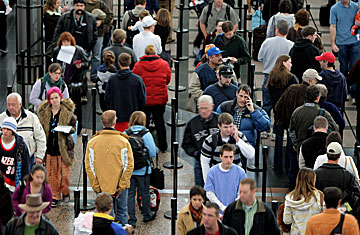
Governors and state legislatures across the country are balking at a new federal requirement that they begin issuing more secure driver licenses and identification for their citizens, which require proof that they are legal residents of the country. If there is no resolution come May, people who live in states that are not in compliance may find that their state-issued driver licenses and ID cards are of no use when they need to board an airplane or enter a federal building. "We are not bluffing on this date of May 11," says Homeland Security Department spokeswoman Amy Kudwa.
At issue is the REAL ID Act, passed by Congress with almost no debate in 2005, requiring states to add costly new security features, including a harder-to-forge design and additional layers of identity verification, to driver licenses and other government-issued identification. One of the recommendations of the 9/11 Commission, it aims to prevent terrorism and reduce the chances of counterfeiting. "The 9/11 hijackers obtained 30 different driver's licenses and IDs, and used 364 aliases," Homeland Security Director Michael Chertoff has noted. "For an extra $8 per license, REAL ID will give law enforcement and security officials a powerful advantage against falsified documents, and it will bring some peace of mind to citizens wanting to protect their identity from theft."
But it won't be that easy, practical or cheap, say the states. In South Carolina, for instance, Governor Mark Sanford warns it will mean residents will have to pay $60 for driver licenses that are good for eight years, rather than the $25 they are now paying for 10-year licenses. And they may find themselves standing in line for up to two hours to obtain those licenses, rather than the 15-minute waits they now experience. So outraged are the states that legislatures in South Carolina, Maine, Montana, New Hampshire, Oklahoma and Washington have passed laws banning their agencies from complying with the act, according to the National Conference of State Legislatures; Idaho thumbed its nose at the law by appropriating $0 for its implementation this year.
The four states that are objecting the most, however, are South Carolina, Montana, New Hampshire and Maine. The four have thus far ignored a March 31 deadline to seek an extension that would technically put them in compliance with the law for up to two years. If they fail to meet the deadline, that means starting May 11 their citizens would not be allowed to use identification from those states to board aircraft or enter government buildings. If they lack any other acceptable ID, they would be subjected to additional security screening that would make travel an extra hassle.
The chief issue, states say, is the estimated $4 billion cost of the law over the next 10 years, which comes at a time when state budgets are already stressed to the breaking point. So far, the feds have provided only $380 million in grants to offset those costs. "How dare they not pay for it?" Pennsylvania Governor Ed Rendell told TIME. "The cost is 12 days of the war in Iraq and Afghanistan."
Last Thursday, Rendell, South Carolina's Sanford and the governors of Delaware, Nevada and Arizona held a heated conference call with Chertoff to air their complaints. And that same day, the National Governors Association sent letters to President Bush, the House and Senate leadership and congressional appropriators demanding: "If the federal government is going to direct state security practices over traditional state functions such as driver's licenses and identification cards, then the federal government should pay the states' cost of compliance." The question, however, is which cost will be higher for the states: Paying for the new cards, or listening to the complaints of people who suddenly discover that air travel has become even more unpleasant.
